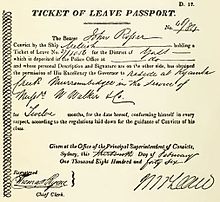Ticket of Leave
The Ticket of Leave was a document certifying parole. It was given to convicts who had shown that they could now be given some liberties. It was originally issued in the Australian penal colonies of the United Kingdom . It was later adopted in the United States (Parole) , Canada, and Ireland . It can be seen as the predecessor of today's suspension of a residual sentence.
Great Britain and penal colonies in Australia
The foundation stone for the ticket system was laid by Governor Philip Gidley King in what was then the British convict colony in what is now New South Wales . It was formally introduced in 1801 to reward convicts who had shown particularly good conduct or rendered service to society.
The ticket of leave entitles them to search for a job or to work independently in a certain district. This could not be left without the approval of the governor or the resident magistrate . Every change of employer or district was recorded on the ticket. The convicts had to work out the money they needed to get the ticket.
Initially, the tickets were issued without reference to the duration of the sentence to be served, sometimes shortly after arriving at the colony. From 1811 onwards the concept emerged that at least a certain part of the sentence should be served in captivity. In 1821 it was determined from when a prisoner was eligible for a ticket. These were four years for a 7 year term and six years for a 14 year term. Those sentenced to life sentences had to wait eight years for a ticket to be considered. At the end of the entire duration of the sentence, a Certificate of Freedom was issued upon request .
Ticket of Leave holders were allowed to marry, bring their families from Great Britain to the colony and purchase property. They were not allowed to carry firearms or board a ship. Their stay was limited to a certain area, which was described in the ticket. If the holder had to change the district regularly, a passport was issued.
Often they were asked to pay back the costs of their deportation to the colonies.
A convict who kept the ticket until half of the original sentence had expired received a conditional pardon , which lifted the restrictions. The only thing that was not allowed to leave the colony. In the event of violations, the owners could be arrested without an arrest warrant and convicted without the right to appeal to the Supreme Court and lost their acquired property.
The ticket of leave had to be renewed annually, the holders had to be present at church services and roll calls. The ticket contained extensive information on where and in what year the holder was sentenced. It contained the name of the ship on which he had been deported, the length of the sentence and a detailed description of the convict, year of birth, previous employment and place of origin.
The ticket consisted of two parts. The actual ticket was issued to the person who had to keep it with them at all times. The second part was the butt , this official copy was kept by the government. While the actual tickets are quite rarely preserved due to their constant use, the butts are often found in the archives.
According to the criminal law reformer Alexander Maconochie , tickets could be revoked for the slightest irregularity and a very large proportion of the holders sooner or later returned to forced labor for the government.
British military
During World War II, the term was used colloquially for the papers that allowed a soldier to retire from active service.
Ireland
Walter Crofton introduced the Irish Ticket of Leave .
United States
A similar system still exists today as a watchword in the USA .
Individual evidence
- ^ Australia Convict Tickets Of Leave 1824-1874, accessed September 23, 2016
- ↑ Bottomley: Parole in Transition: A Comparative Study of Origins, Developments, and Prospects for the 1990s . scholar.google.com. Retrieved May 11, 2008.
- ↑ Alexander B. Smith, Louis Berlin: Treating the criminal offender . Springer, 1988, ISBN 978-0-306-42885-2 , p. 25 (accessed February 7, 2011).
- ^ Doherty, Fiona: Indeterminate Sentencing Returns: The Invention of Supervised Release . In: NYUL Rev. . 88, 2013.
- ^ Richard Smith: Jamaican volunteers in the First World War: race, masculinity and the development of national consciousness , 1st publ. Edition, Manchester Univ. Press, 2004, ISBN 978-0-7190-6985-7 .

